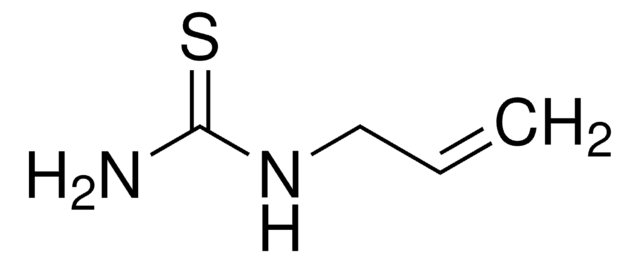All Photos(1)
About This Item
Linear Formula:
(CH3)2CHCH(CH3)CH(CH3)2
CAS Number:
Molecular Weight:
114.23
Beilstein:
1696869
EC Number:
MDL number:
UNSPSC Code:
12352100
PubChem Substance ID:
NACRES:
NA.22
Recommended Products
Quality Level
Assay
98%
form
liquid
refractive index
n20/D 1.404 (lit.)
bp
113-114 °C (lit.)
mp
−110 °C (lit.)
density
0.719 g/mL at 25 °C (lit.)
SMILES string
CC(C)C(C)C(C)C
InChI
1S/C8H18/c1-6(2)8(5)7(3)4/h6-8H,1-5H3
InChI key
RLPGDEORIPLBNF-UHFFFAOYSA-N
Looking for similar products? Visit Product Comparison Guide
General description
Kinetics and mechanism of reaction of OH radicals with 2,3,4-trimethylpentane in the presence of NO has been investigated. Kinetics of reactions of C6H5 radical with 2,3,4-trimethylpentane has been measured by cavity ringdown spectrometry.
Signal Word
Danger
Hazard Statements
Precautionary Statements
Hazard Classifications
Aquatic Acute 1 - Aquatic Chronic 1 - Asp. Tox. 1 - Flam. Liq. 2 - Skin Irrit. 2 - STOT SE 3
Target Organs
Central nervous system
Storage Class Code
3 - Flammable liquids
WGK
WGK 3
Flash Point(F)
39.2 °F - closed cup
Flash Point(C)
4 °C - closed cup
Personal Protective Equipment
dust mask type N95 (US), Eyeshields, Gloves
Choose from one of the most recent versions:
Already Own This Product?
Find documentation for the products that you have recently purchased in the Document Library.
Customers Also Viewed
Dapeng Liu et al.
The journal of physical chemistry. A, 121(5), 927-937 (2017-01-11)
Reaction rate coefficients for the reaction of hydroxyl (OH) radicals with nine large branched alkanes (i.e., 2-methyl-3-ethyl-pentane, 2,3-dimethyl-pentane, 2,2,3-trimethylbutane, 2,2,3-trimethyl-pentane, 2,3,4-trimethyl-pentane, 3-ethyl-pentane, 2,2,3,4-tetramethyl-pentane, 2,2-dimethyl-3-ethyl-pentane, and 2,4-dimethyl-3-ethyl-pentane) are measured at high temperatures (900-1300 K) using a shock tube and narrow-line-width OH
A R Dahl et al.
American Industrial Hygiene Association journal, 48(6), 505-510 (1987-06-01)
A method for determining the uptake of inhaled vapors in rats is described. The method uses gas chromatographic data to enable calculations of vapor concentration differences upstream and downstream from a rat exposed to the vapor by the nose-only route.
C T Olson et al.
Toxicology letters, 37(3), 199-202 (1987-08-01)
The urinary metabolites of the potent nephrotoxic hydrocarbon 2,3,4-trimethylpentane (2,3,4-TMP) given Fischer-344 male rats by gavage included 1-hydroxy-2,3,4-trimethylpentane, 2,3,4-trimethyl-1-pentanoic acid and 2,3,4-trimethyl-5-hydroxy-1-pentanoic acid. Analyses were performed by gas-liquid chromatography (GC) and gas-liquid chromatography/mass spectrometry (GC/MS). A comparison of the urinary
K O Yu et al.
Biomedical & environmental mass spectrometry, 14(11), 639-641 (1987-11-01)
Branched-chain hydrocarbon-induced nephropathy in male rats was examined using 2,3,4-trimethylpentane. Lesions are elected only in male rats, not in females or in controls. Mechanisms of nephropathy may be the interaction of metabolites with the male rat-specific protein alpha 2u globulin.
N J Delraso et al.
In vitro cellular & developmental biology : journal of the Tissue Culture Association, 25(11), 1031-1038 (1989-11-01)
Primary rat hepatocyte suspension cultures (approximately 2 X 10(6) cells) exposed to solubilized 2,3,4-trimethylpentane at concentrations ranging from 7.9 to 31.5 mM under two different culture conditions resulted in a linear dose response, as determined by lactate dehydrogenase leakage and
Our team of scientists has experience in all areas of research including Life Science, Material Science, Chemical Synthesis, Chromatography, Analytical and many others.
Contact Technical Service











